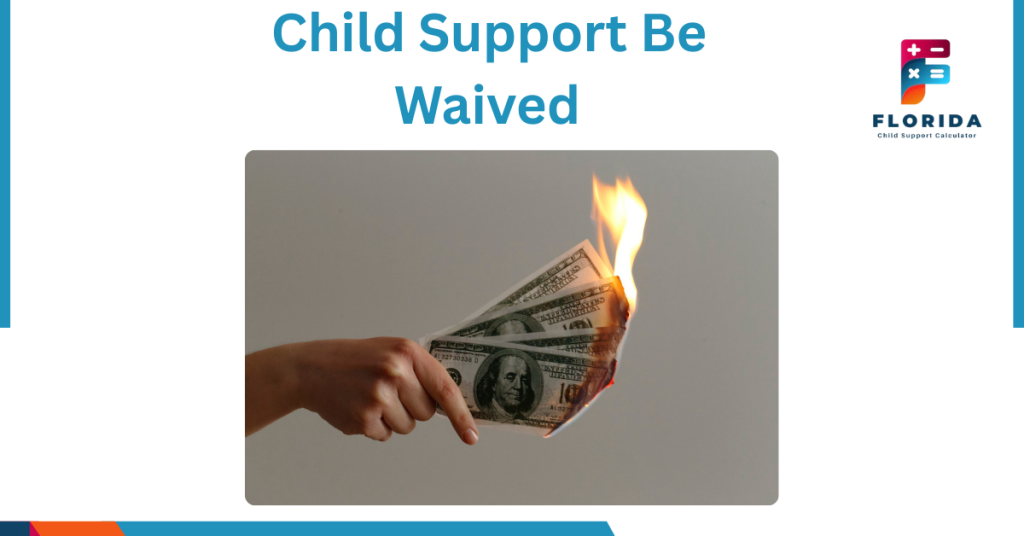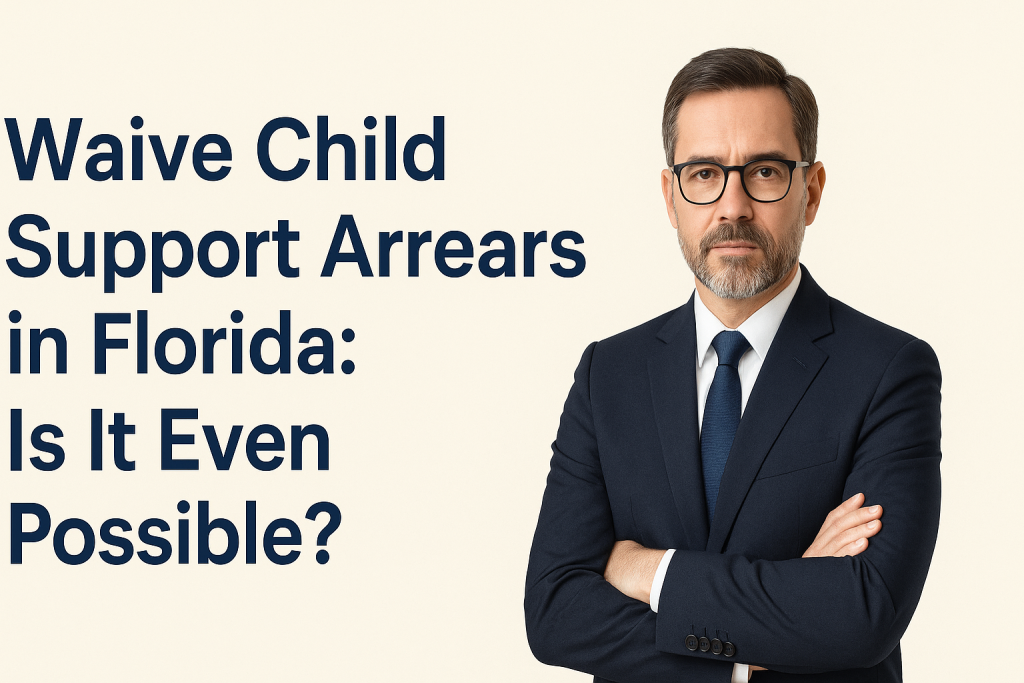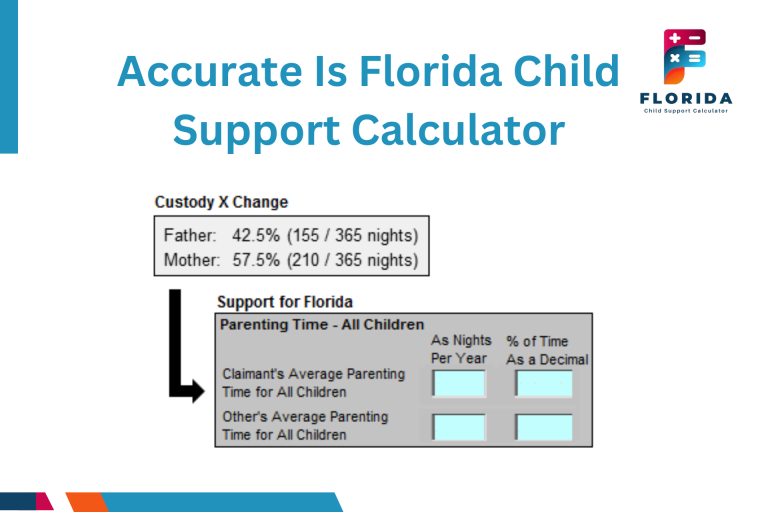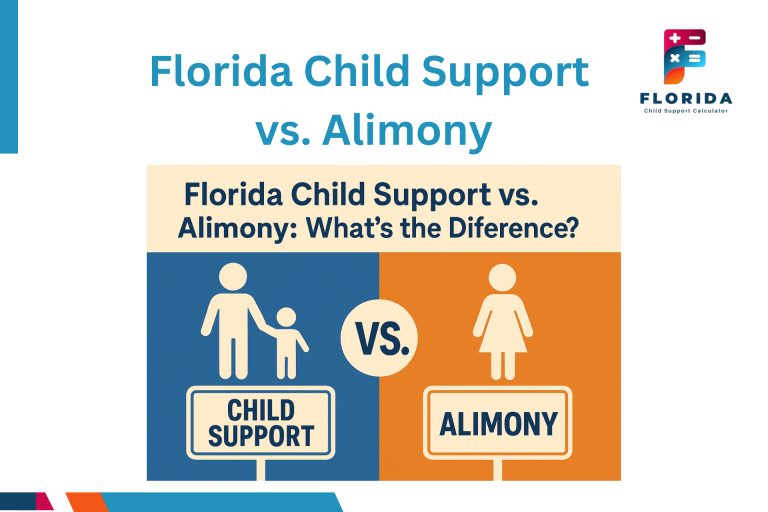Can Child Support Be Waived in Florida?
Can child support payments be waived in Florida? That question often pops up, especially when money’s tight or life turns upside down. You might think that if both parents agree, it’s a done deal. But here’s the truth: Florida law says child support is about the kid, not the grown-ups.

If you’re jobless, sick, or just trying to survive, you still have legal steps to follow. Whether you’re learning about Florida child support guidelines for the first time or wondering if you can modify support due to hardship, we’ve got you.
When (If Ever) Can Child Support Be Waived in Florida?
Let’s get one thing clear: child support isn’t a gift. It’s a responsibility, one that the court takes very seriously. Even if you and your co-parent agree to waive payments, Florida law still wants proof that your child is safe, stable, and supported.
Is It as Easy as Saying “No Thanks” to Payments?
You can’t just say, “We’re good without it,” and move on. The court might smile politely and still order payments. Florida sees child support as the child’s right, not the parent’s choice.
Sometimes people think their parenting plan covers it all, but that plan needs a judge’s stamp to matter. Even mutual agreements must pass court review, or they’re just pieces of paper with no power.
Why the Court Usually Says “Not So Fast”
The court always puts the child’s best interest first. Even if the other parent says, “I don’t want the money,” the judge could still require payments.
In cases where income shifts or custody changes, a support recalculation might be possible. But skipping payments without approval? That’s risky and could land you in trouble. It’s not about you, it’s about the child.
What If a Personal Financial Hardship Affects My Child Support Payments?
Life hits hard sometimes, job loss, illness, or emergencies can mess up your money fast. But here’s the thing: even during tough times, you can’t just stop child support in Florida without asking the court first.
What Counts as a Legitimate Hardship in Florida?
Not every “I’m broke” story works. The judge needs proof. Lost your job? That might work if you put in real effort to find new work. Got hurt and can’t work? Bring medical records.
Some parents believe that just being tight on cash is enough, but courts want full income details before making changes. The goal is fairness for you and your child.
The Court’s Checklist for Financial Struggles
Here’s what usually matters:
- Involuntary job loss
- Serious medical issues
- Natural disasters or emergencies
If your situation fits, you can request a change. But you’ll need to file a modification petition and provide evidence. Just saying “I’m struggling” won’t work; you need paperwork.
Examples of Valid vs. Invalid Hardship Claims
| Situation | Court Likely to Accept? | Notes |
|---|---|---|
| Job loss due to a layoff | Yes | Provide proof + job search logs |
| Quitting a job by choice | No | Considered a voluntary action |
| Surgery or disability | Yes | Submit medical records |
| Starting a new business | No | Seen as an optional financial risk |
Do I Have to Pay Child Support if I’m Unemployed in Florida?
It’s easy to assume that no job means no child support. But Florida courts don’t see it that way. They might still expect payments based on your earning potential, not just your paycheck.
Unemployed Doesn’t Always Mean “Off the Hook”
If you’re between jobs, the court may look at your work history to guess what you could be earning. This is called imputed income, and it’s used when someone quits or underreports income.
Before you assume you’re safe, remember: even unemployed parents are often expected to contribute something.
Imputed Income: What It Means and Why It Matters
Let’s say you made $50k last year, but now you’re “freelancing.” The court might still use that $50k to calculate your support.
Unless you show proof that your unemployment is legit and ongoing, your payments won’t stop. You may qualify for a child support adjustment, but only if you file the right way.
How Does a Child’s Best Interest Factor into Child Support Being Waived?
In Florida, the court doesn’t just listen to parents. It listens for what’s best for the child. No matter how well the parents get along, the law still protects the child’s needs above everything else.
The Child’s Right vs. The Parent’s Struggles
Even if you and the other parent agree to skip support payments, that doesn’t mean the court will. Judges think long-term: food, school, clothes, health care. And that’s where the child’s best interest comes in.
Your struggles matter, but not more than your kid’s future. Courts stick to Florida child support guidelines to decide what’s fair. If it’s not in the child’s favor, they’ll step in, agreement or not.
Why Judges Say “It’s Not About You: It’s About the Kid”
The court doesn’t care who’s the “nice one” or who said, “I won’t ask for money.” It’s not personal. It’s policy. Judges follow what’s written in the Florida child support worksheet, and if those numbers say the child needs support, then that’s what happens.
So even if both parents want to waive support, they’ll have to prove it won’t hurt the child, now or later.
Waive Child Support Arrears in Florida: Is It Even Possible?
Arrears means unpaid child support that’s stacked up over time. Can you get rid of it? Not easily. Florida treats back child support like debt owed to the child, not the other parent.

The Harsh Truth About Back Payments
Here’s the deal: most courts won’t let you erase arrears just because things got hard. You might be able to lower future payments, but those missed ones stick. Even if the other parent says “forget it,” that doesn’t make it legal.
Many people confuse this with child support modification, but arrears are separate and often harder to fight off.
When (Rarely) the Court Might Consider It
Now and then, courts make exceptions. Maybe the child no longer lives with the parent who was supposed to get support. Or maybe that parent agrees in writing, and the judge approves. But it’s rare.
Even if you try, the state might still enforce it. Child support enforcement doesn’t go easy on arrears unless there’s strong evidence and a valid reason.
Can the Receiving Parent Forgive the Arrears?
Technically, yes. But that forgiveness still needs to be signed off by the court. And if Florida DOR (Department of Revenue) is involved, it gets trickier. They may block the waiver even if the other parent agrees.
That’s why even small arrears cases can lead to big problems like jail for unpaid support. Forgiveness sounds simple, but legally, it’s a big ask.
Seek Legal Guidance for Modifying or Waiving Child Support in Florida
Let’s face it, family law is confusing. If you’re thinking about waiving or changing child support, it’s smart to ask someone who knows how the system works. Florida courts don’t accept casual promises.
How a Lawyer Can Help You Avoid Court Headaches
Even if you feel confident, a lawyer can show you what judges look for. They help with paperwork, filing, and speaking in legal language that gets results. It’s not just about knowing the law, it’s about using it right.
A strong case with help from a pro is more likely to succeed, especially when it’s about factors that influence child support or custody shifts.
Paperwork You’ll Need to File for Modification
If you want to ask for less support or cancel it, the court won’t just take your word for it. They’ll need documents. Lots of them. Here’s what to gather:
- Income statements or proof of unemployment
- Medical reports if you’re sick or disabled
- A new parenting plan or support estimate
- A copy of your current order
- Form 12.905(b) (petition to modify support)
Quick Recap: What You Can and Can’t Do
Before we move on, let’s pause. Many parents get confused about what’s legally allowed when it comes to waiving child support. So here’s a quick recap to make it super clear, and save you from big mistakes later.
Summary of Legal Possibilities
| Scenario | Can Support Be Waived? | Court Involvement Required? |
|---|---|---|
| Mutual parent agreement | No | Yes |
| Parental rights termination | Yes | Yes |
| Unemployment | Usually No | Modification needed |
| Step-parent adoption | Yes | The court must approve |
| Forgiveness of arrears (rare) | Not easily | With legal approval |
Reminder: Even with modification petitions, the court always checks the child’s best interest first.
FAQs – Real People, Real Questions
Let’s hit the most common questions people in Florida ask when they’re confused about child support. If you’ve asked it, someone else probably has too.
Final Word: Waiving Child Support Isn’t Simple, But It’s Not Impossible
Waiving child support in Florida isn’t like turning off a light switch. It’s more like asking a judge to bend the rules for a good reason. Most of the time, they won’t. But in special cases, they just might.
If your situation has changed, your next step should be finding the right forms, gathering your income details, and submitting a request that fits the law. Many parents use our Florida child support calculator to estimate what’s fair before filing anything.
You don’t have to figure it all out alone. When in doubt, legal help is the smartest move.






